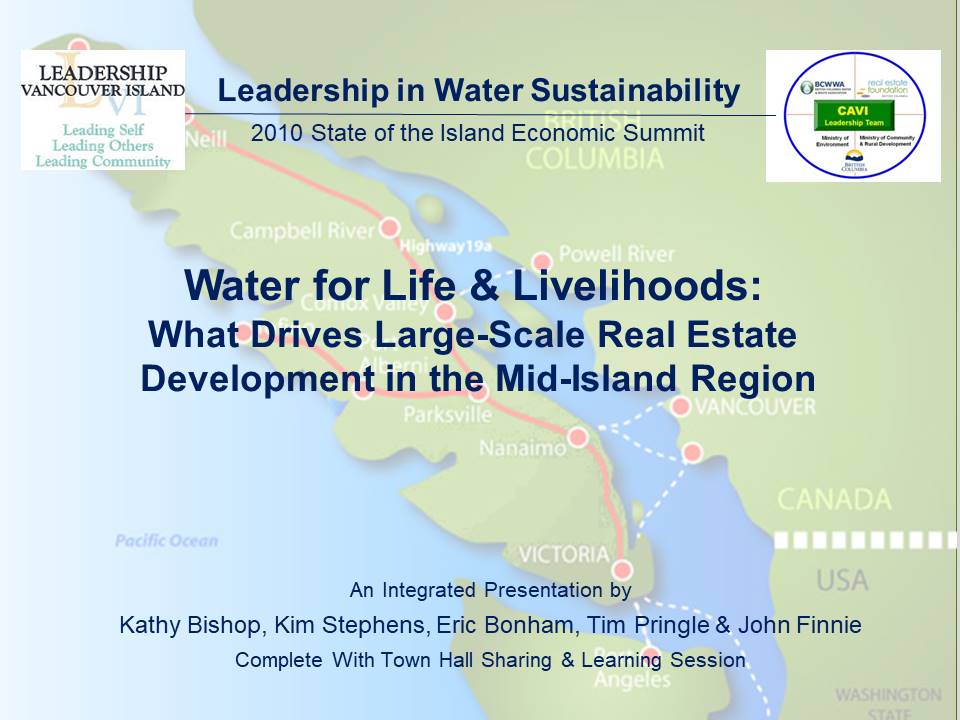CONVENING FOR ACTION ON VANCOUVER ISLAND: 2010 was a ‘watershed year’ for the Water Sustainability Action Plan, with outreach taking place at events in three regional districts to provide peer-based learning for Living Water Smart, Building Greener Communities, and Adapting to a Changing Climate in British Columbia
Note to Reader:
Released in February 2004, the Water Sustainability Action Plan for British Columbia demonstrates what can be achieved through a ‘top-down & bottom-up strategy’. It was an outcome of collaboration between the provincial government and the Water Sustainability Committee of the BCWWA. Known as the WSC, the committee ultimately morphed into a stand-alone and independent legal entity – that is, the Partnership for Water Sustainability in British Columbia (“the Partnershp”).
In retrospect, 2010 was a milestone year for ‘convening for action’ under the umbrella of the Water Sustainability Action Plan for British Columbia. Much was accomplished in an extremely busy year. In the months leading up to its incorporation as a non-profit society (in November 2010), the Partnership organized and provided program development for three flagship events under the umbrella of CAVI, Convening for Action on Vancouver Island.
The Partnership also delivered program components within seven other major events organized by other organizations. The latter events were held in three regions, namely: Vancouver Island (2), Lower Mainland / Howe Sound (4) and the Okanagan (1).
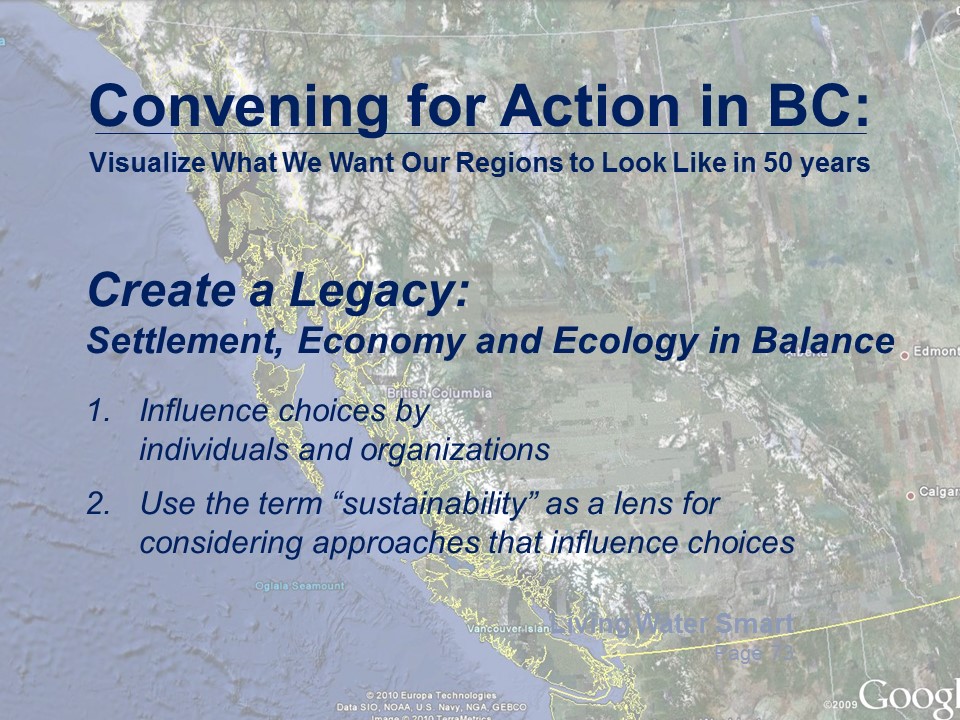
Implementing a New Culture for Urban Watershed Protection and Restoration in British Columbia
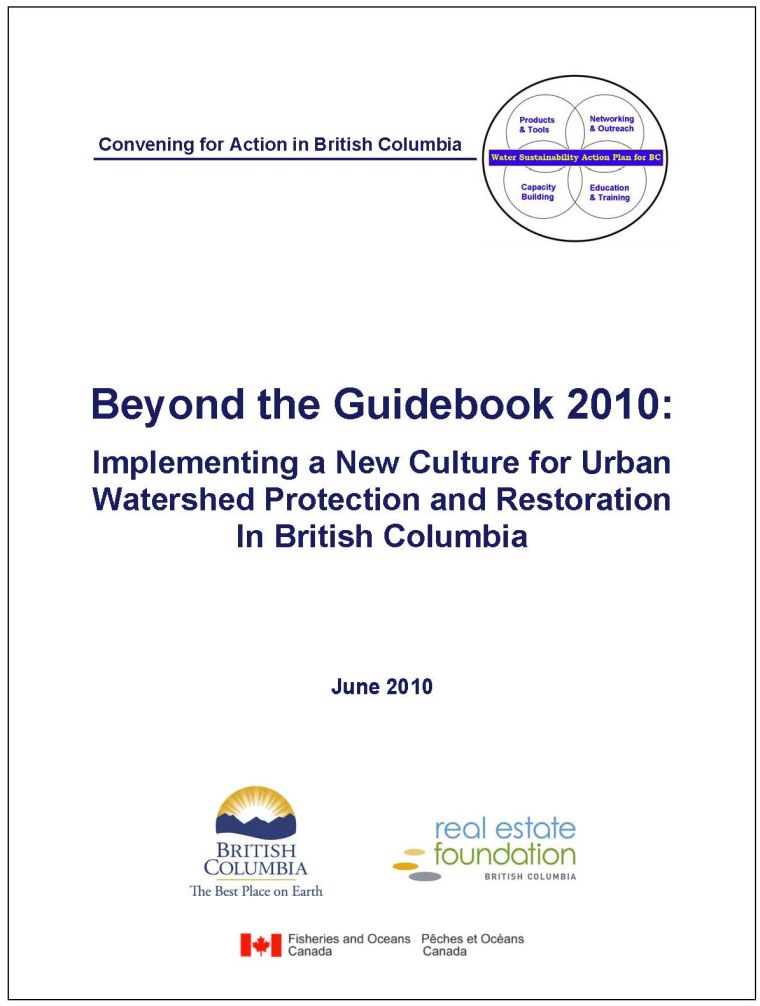 The Partnership’s outreach spotlight in the second half of 2010 was on the release and rollout of the second in the Beyond the Guidebook series of guidance documents for rainwater management and restoration of hydrologic function in urban watersheds.
The Partnership’s outreach spotlight in the second half of 2010 was on the release and rollout of the second in the Beyond the Guidebook series of guidance documents for rainwater management and restoration of hydrologic function in urban watersheds.
Stormwater Planning: A Guidebook for British Columbia, released in June 2002, laid the groundwork for ‘designing with nature’ to create greener communities, live water smart and prepare for climate change. Beyond the Guidebook 2010 built on the Guidebook foundation and illustrated how breakthroughs happen when decision-makers in government collaborate with grass-roots visionaries in the community.
Beyond the Guidebook 2010 describes how a ‘convening for action’ culture has taken root in British Columbia. Bringing together local government practitioners in neutral forums has enabled implementers to collaborate as regional teams. Their action-oriented focus has resulted in ‘how to do it’ examples that help decision-makers visualize what ‘design with nature’ policy goals look like on the ground.
To Learn More:
Download a copy of Beyond the Guidebook 2010: Implementing a New Culture for Urban Watershed Protection and Restoration in British Columbia
Visit the Beyond the Guidebook 2010 dropdown on the Rainwater Management community-of-interest.

Flagship events held under the umbrella of the Water Sustainability Action Plan in 2010
2010 Bowker Creek Forum (held at University of Victoria, February)
The Bowker Creek Forum was an opportunity to learn about urban watershed management successes and challenges from the Bowker Creek Initiative, and celebrate the 100-year Action Plan for implementing the Bowker Creek Blueprint.
The Forum facilitated sharing of information about successful approaches, so that they could be replicated in other jurisdictions. While the spotlight was clearly on the Bowker Creek Blueprint, local government representatives from Metro Vancouver and ‘north of the Malahat’ also shared their experiences related to achieving watershed-based objectives.
Create a Legacy Through Collaboration
 “The role that community groups have played in Blueprint development is impressive. Speaking from experience, it sends a powerful message when community representatives are motivated by the common good and are in a position to express their commitment in terms such as these: we live here, and we are passionate about the legacy and the quality of life that we leave for our children and grand-children,” stated Kim Stephens, Partnership Executive Director, and the program lead for the Action Plan from inception through development through implementation.
“The role that community groups have played in Blueprint development is impressive. Speaking from experience, it sends a powerful message when community representatives are motivated by the common good and are in a position to express their commitment in terms such as these: we live here, and we are passionate about the legacy and the quality of life that we leave for our children and grand-children,” stated Kim Stephens, Partnership Executive Director, and the program lead for the Action Plan from inception through development through implementation.
“It is essential that their story be told so that others will be inspired to follow the lead of the Bowker Creek Initiative. Simply put, transformational change will result when decisionmakers in government collaborate with grass-root visionaries in the community to create a legacy.”
To Learn More:
Download the 1-page Agenda Overview for Bowker Creek Forum: An Integrated Approach to Urban Watershed Management.

2010 Nanaimo Region Water Pricing Workshop (held in Parksville, September)
Described as the first of its kind in Canada, the workshop was part of the rollout to stimulate a national dialogue on sustainable water management. The workshop program was a unique blend of research and practice. It connected the dots between three initiatives:
- Action for Water, implemented by the Regional District of Nanaimo following approval in a referendum in November 2008.
- Worth Every Penny: A Primer on Conservation-Oriented Water Pricing, released in May 2010.
- Beyond the Guidebook 2010: Implementing a New Culture for Urban Watershed Protection and Restoration in British Columbia, released in June 2010.
The process for program development for the workshop was the genesis for the phrase ‘sustainable service delivery’. The process synthesized four key ideas into one easy-to-remember term: financial accountability, sustainable infrastructure, and service delivery.
To Learn More:
For details of the program, click on Draft Agenda for Nanaimo Water Pricing Workshop
Download Workshop Storyline, the opening presentation by John Finnie, Chair of CAVI, Convening for Action on Vancouver Island.
Watch the closing synopsis by Eric Bonham:


2010 Comox Valley Developers Dialogue (held in Courtenay, December)
The purpose of the Developers Dialogue was to open lines of communication to the local development community. The Developers Dialogue was portrayed as an opportunity for the local development community and local government staff to focus on how all the players can work together towards low environmental impact development.
Collaboration, Alignment, Consistency
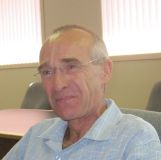 Derek Richmond, Manager of Engineering with the City of Courtenay, opened the session by describing the elements of a successful project outcome as portrayed in the image below. His emphasis was on the process that leads to success. He connected the dots to integrated watershed planning, ‘front-end loading’ in the development application process, and greenhouse gas reduction.
Derek Richmond, Manager of Engineering with the City of Courtenay, opened the session by describing the elements of a successful project outcome as portrayed in the image below. His emphasis was on the process that leads to success. He connected the dots to integrated watershed planning, ‘front-end loading’ in the development application process, and greenhouse gas reduction.
In summary, this ‘sharing and learning’ session initiated a conversation with the Comox Valley development community about collaboration, alignment and consistency.
Quotable Quote
 “The format was excellent for ‘stirring the pot’ as it allowed for a variety of ideas, questions and comments to flow easily and freely. The non-formal setting made everyone comfortable in sharing comments, whether positive or negative. This is certainly appreciated among the building and development community,” stated Kip Keylock, representing the Comox Valley Chamber of Commerce.
“The format was excellent for ‘stirring the pot’ as it allowed for a variety of ideas, questions and comments to flow easily and freely. The non-formal setting made everyone comfortable in sharing comments, whether positive or negative. This is certainly appreciated among the building and development community,” stated Kip Keylock, representing the Comox Valley Chamber of Commerce.
To Learn More:
Watch Derek Richmond’s opening comments:

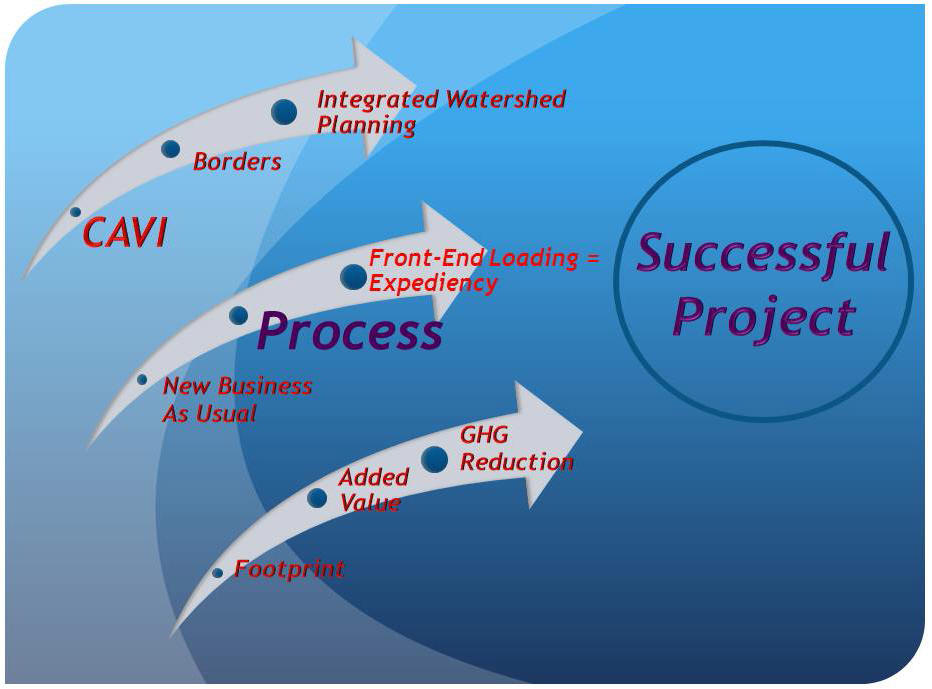
Major Regional Events that included a component delivered by Water Sustainability Action team members
2010 Dialogue in Nanaimo (held in June)
The Dialogue in Nanaimo was structured around a water sustainability panel. Rather than talking heads, the panel engaged in a form of ‘improv theatre’ to feed off each other in spontaneously expressing key messages about water. This primed the audience for ‘small group’ dialogues in eight theme areas. The small groups dialogue were followed by a ‘big group’ dialogue.
The ‘Dialogue in Nanaimo’ was the venue for the formal launch of Beyond the Guidebook 2010. John Finnie, Regional District of Nanaimio, made the announcement on behalf of the ‘convening for action’ partnership. Kim Stephens, Ted van der Gulik and Eric Bonham were the other members of the Action Plan team who contributed to the day.
To Learn More:
Watch John Finnie.
2010 State of the Island Economic Summit (held in Nanaimo, October)
A prime illustration of the collaboration that the Premier Gordon Campbell called for in his keynote address was the emerging relationship between the Vancouver Island Economic Alliance (VIEA) and CAVI, Convening for Action on Vancouver Island, a flagship program under the Action Plan umbrella.
VIEA and CAVI had come together because of a shared vision for water sustainability. The Summit included an afternoon breakout session organized by the Action Plan team (Kim Stephens, Tim Pringle, Eric Bonham, and John Finnie) and titled Water for Life and Livelihoods: What Drives Large-Scale Real Estate Development in the Mid-Island Region.
To Learn More:
Download a copy of the Lesson Plan for the Action Plan breakout session.
Download a copy of the integrated presentation by Kathy Bishop, Kim Stephens, Eric Bonham, Tim Pringle and John Finnie.
Watch Tim Pringle describe what drives large-scale real estate development in the Mid-Island region.

